In a sense, I've done the essentials. I walked the castle gardens, climbed to witness the Goldsworthy magic, touched the coast and smelled the sea.
So where to today? It was to be the most dry of all my days here, so of course, I wake up to a misty, drizzly wetness.
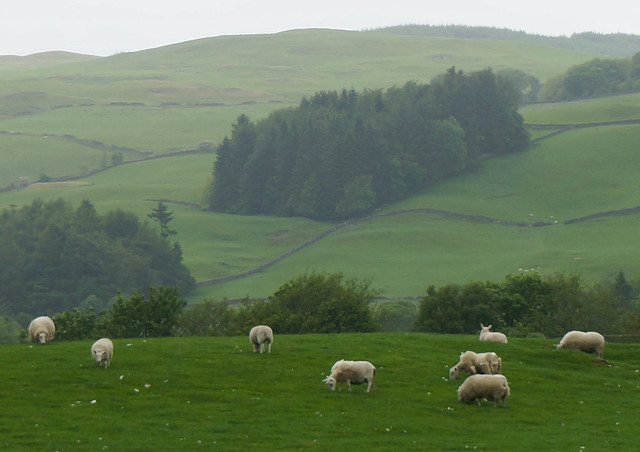
I don't care. My day today doesn't depend on weather. It depends on a good attitude and a firm grip on the wheel of my dirty little car.
Breakfast is fantastic! It always is good here and in many places in the UK, but Greg has figured me out completely by now and I have my wonderful fruits with yogurt and honey and a bit of granola and then move on to his expertly presented dish of scrambled eggs (not too much, Greg, not too much! Yes, perfect!) with mushrooms, roasted tomato, and Scottish salmon. Oh, and a slice of his home made bread.
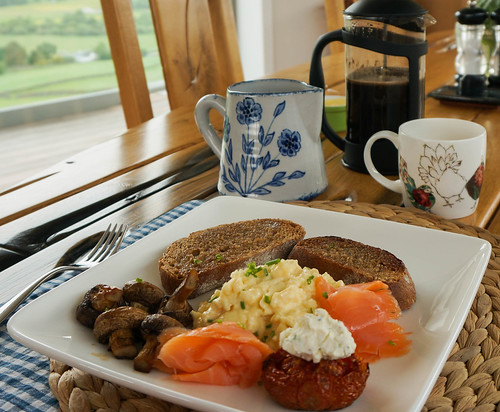
And then I head out.
At first, I concentrate on the roads. But the white speckled fields are like magnets! I pull over again and again to stare at the sheep, who oftentimes stare right back.
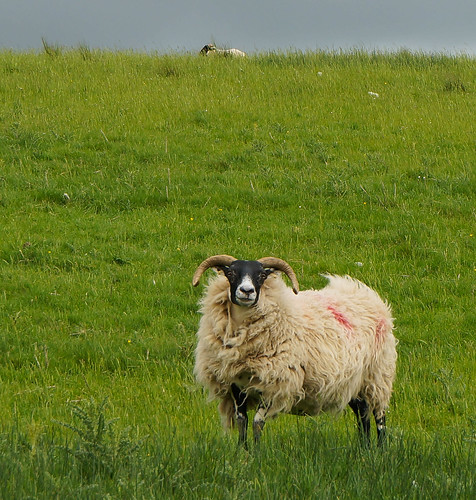
I would do it more often -- they are disarming! Watching a lamb wiggle its butt as it sucks milk from the ewe will make even a tough person smile. But it's hard to find a spot to pull over just as you're witnessing sheep magic, so the images of their romps and cavorts will have to remain mainly in my head and heart.
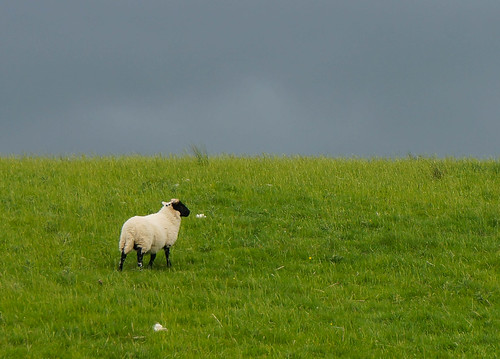
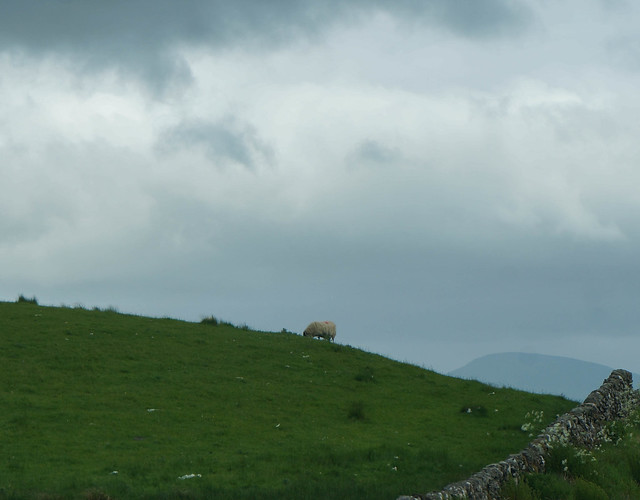
So, a question for you: can you say Kirkcudbright out loud? Go ahead, say it! (It's my destination for today. Population: 3500.) No, you got it wrong! And if I gave you another shot at it, you'd get that wrong as well. It's Kirr-KOO-bree. Anything else produces a scratch of the head. As in -- I wonder what place she is speaking about?
The drive to Kirkcudbright is so windy and curvy and dippy that I feel dizzy when an hour and a few minutes later I leave the car to explore. It's like getting off a rocky boat -- you don't get your legs back for a while.
But I'm enthusiastic about being here. Kirkcudbright calls itself an artists' town. There are galleries, shops, a few cafes, there is a good museum. You're thinking maybe it's the Scotland equivalent of St. Ives?
No, not that. As the woman in the museum tells me -- we haven't been discovered yet! By "we," she means all of Dumfries and Galloway.
It's true. When I ask in a shop if they ever get busy, she thinks about it and says -- yes, it can get busy if there is a festival in town. I had checked the festivals. They are few and far between.
It is, to me, obvious why this place remains so untouched by tourism (what few visitors I see today are all like me -- with graying hair, out to see a garden or two). It's damn hard to move around here! There is a rail line to Dumfries, but that's it. And while the distances from Dumfries aren't huge, they are almost all along the tiny roads I've been forced to navigate. I've seen not a single touring bus. The connecting roads wouldn't accommodate them. And so you have to spend time in the car if you want to take in even a fraction of the area. Dumfries and Galloway is exactly the size of Delaware and I'd say I managed to see about 20% of it, spending sometimes upwards of three hours a day in my little dirty Fiat (though Greg says a lot of the cow dung has disappeared!).
I had great plans for my visit to Kirkcudbright: Do a town walk. Visit the museum. See a few galleries. Do a river walk. Perhaps visit the second museum. Stop at a cafe. That was the short list.
In fact, I did not get through even a fraction of that. Here's why:
I started leisurely, with a visit to a gallery. Nice stuff by local artists from Lockerbie (population: 400). And if that word gives you a catch in the throat (remembering the 1988 Pan Am bombing), imagine the effect on the villagers there.
In a sense, the art at the gallery, while fine, takes a backseat to the conversation I am overhearing between two visitors and their dogs and the woman who has brought the art to this place. The dogs -- Mollie and Maggie, are a smashing hit with her! It's completely pleasant to witness such instant mutual affection.
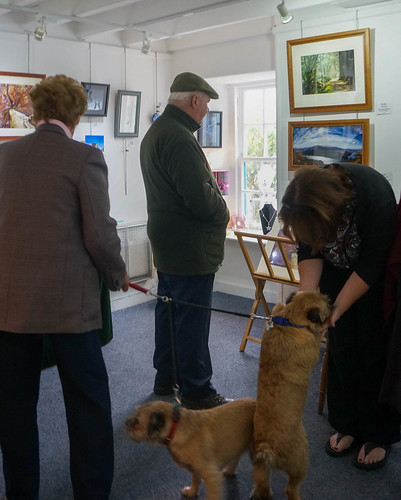
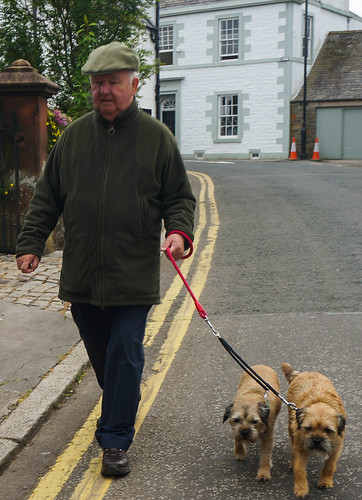
(later, out walking again...)
My next stop is to be the National Trust property, Broughton House. But I get distracted by the high school students passing in front, who seem to be taking their lunch break now.
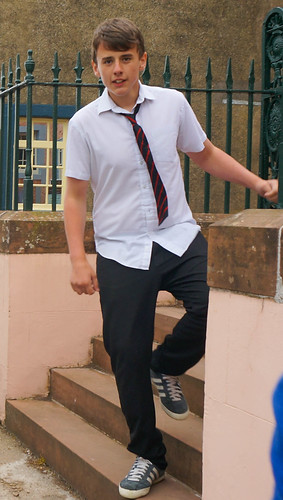
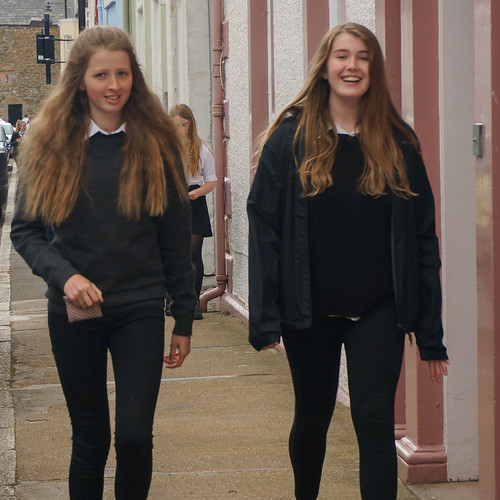
Okay, the House. It used to be the residence of Edward A. Hornel. If you're not into early twentieth century art, then you wont know that he was a prominent painter here. I myself had never seen his art, but honestly, your interests are in part shaped by where you are and if I'm in the home town of Hornel, I'm surely going to drop in on the most important house here, which happens to be his former home.
And it's nice enough. The paintings of children are interesting, as are the furnishings -- all carefully safeguarded, as his will obligated the Trust to keep everything in its place after his death.
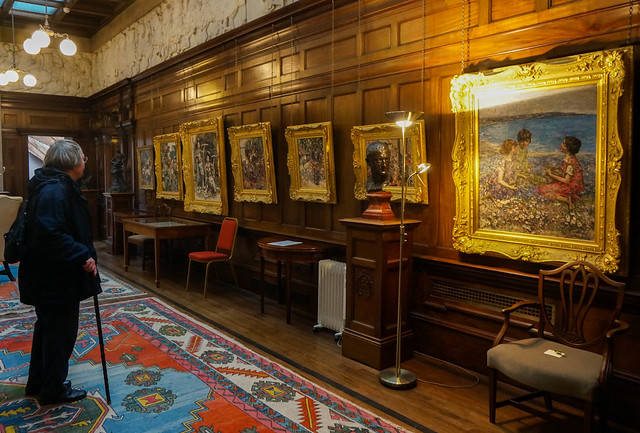
Fine. That takes about fifteen minutes. But then comes the garden behind the house!
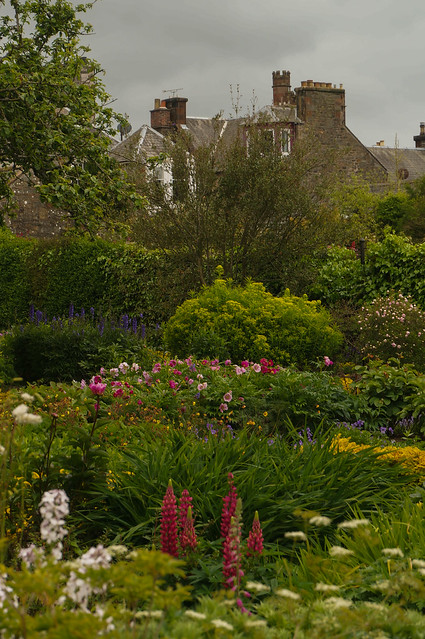
Oh!
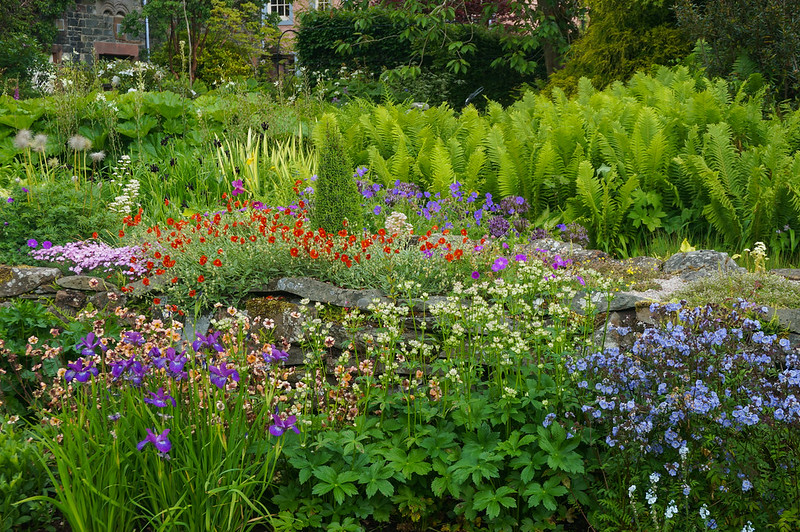
Oh, oh!
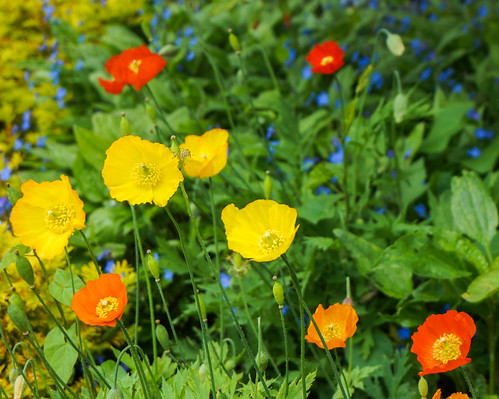
Claude Monet began work on his garden in Giverny nearly twenty years before Hornel purchased the Broughton House (Hornel lived there from 1901 until his death in 1933). The Scottish artist had the same fascination with Japan as Monet (Hornel actually spent a year in Japan in 1993; Monet merely collected Japanese prints and corresponded with Japanese artists). Did Hornel know of Giverny?
The Broughton House Gardens, particularly now, in late spring, with the prominence of the iris and, too, with the emerging water lilies, surely transports me right to Monet's Gardens!
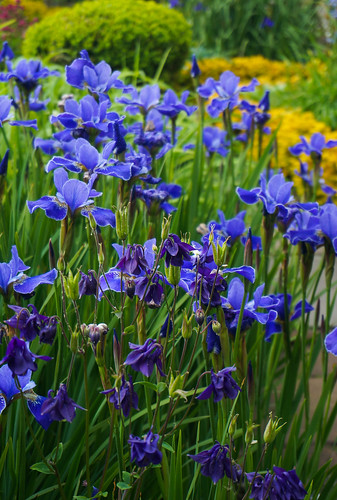
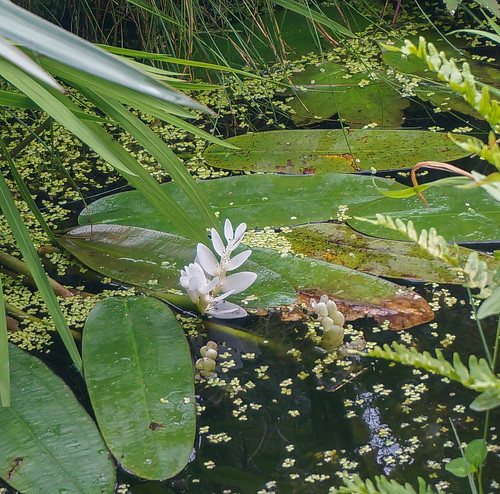
You have to understand: perennial fields, beds, borders -- call them what you will -- display, to me at least, the essence of visual beauty. They're ephemeral, they're whimsical (and too, dependent on the whimsy of the environment). They're stunning.
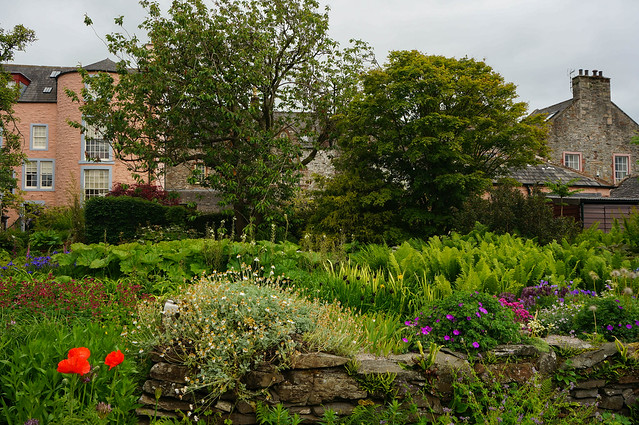
Occasionally, I need a reminder as to why I toil so hard to get those flower fields in shape at home. I need inspiration, I need help, I need to be close to someone who shares my conviction that a blooming siberian iris has all the beauty that the world ever deserves.
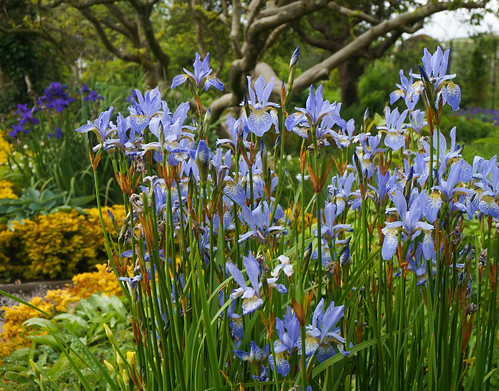
And here I am at Broughton, in love with this small (by most gardening standards) bit of heaven!
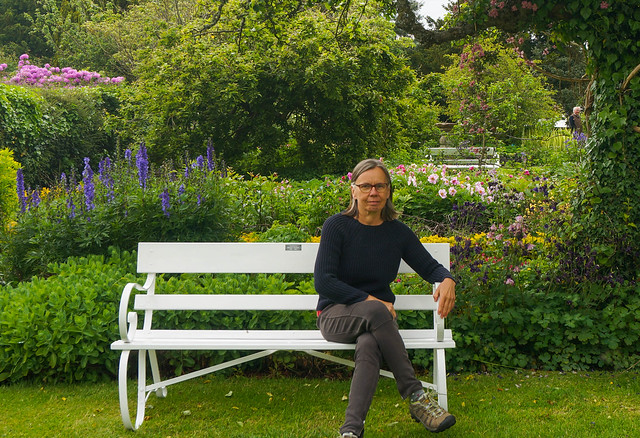
(on a timed release)
Deeply in love.
And so I go back to the ticket seller who is your go-to person for everything (because, you know, they don't have much business and so they don't need much staff) and I ask -- so did he see paintings of Giverny? She didn't know, of course. Stupid Americans -- they think you should know everything. And those pink flowers -- are they small peonies? No answer to that either. But she understands my rapture and when I ask her for another nearby garden recommendation, she gives me one.
Go to Threave Gardens. They have a whole educational component there too. It's a huge estate.
After that, I have just a wee interest in hiking around town.
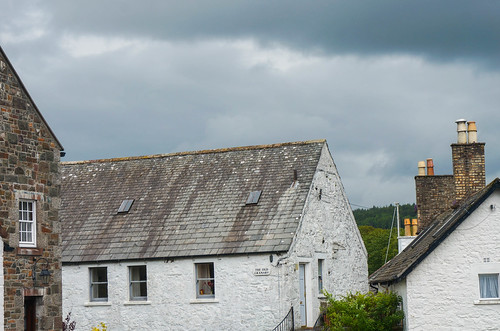
I want to get to Threave before it closes.
But I do go up the river bank. I notice a rather big fishing vessel and I ask the two guys chatting next to it if it's used on a daily basis.
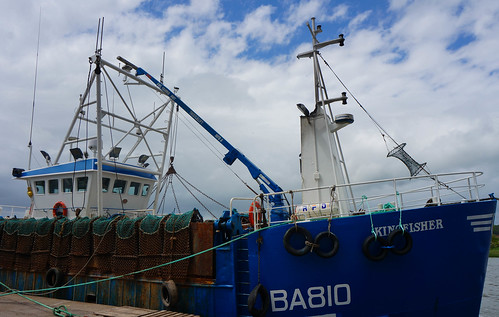
Ask him, says one of the guys. He's the mayor, he knows everything!
The mayor grins, not protesting the characterization. They go out for three day periods.
What do they catch?
Queenies.
Say what?
Queenies.
Queenies? What's that?
He seems surprised that I do not know. Scallops. Not the king ones, the smaller ones.
I walk further along the shore and I pass by a big plant with trucks in the courtyard. Huge white sacs stand, filled with... something.
Excuse me, do you know what's in those? I ask a random gent walking along the road.
Shells. Scallop shells.
Are they throwing them away?
I don't know. Maybe they're crushing them and filling holes in the road!
A worker moves quickly between the sacks and truck. Excuse me... the sacks?
Shells.
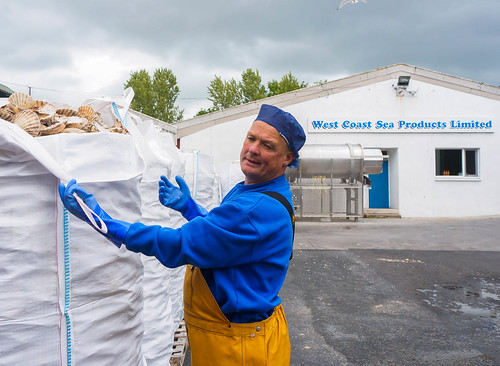
Where do they go?
Well, funny you should ask. We just shipped off a cargo yesterday, to the Philippines.
Do they need them there for roads?
No, they wash them for us and then they send them back to the UK, where they're used in restaurants, home decorations, things like that. Did you know it's cheaper to send them clear across the oceans to have them cleaned than to have them cleaned here? Remarkable, isn't it?
How do you measure a carbon foot print? Because if you're used to merely calculating distance from the place of origin, then it will be very low one indeed for these babies. Or do you ask where something is washed and tended?
A quick poke into a shop (yes, that kind!)...
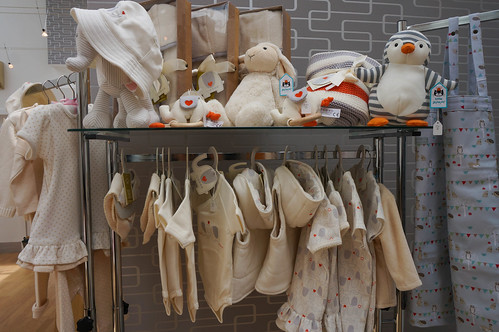
... and then I'm back in the car, driving to Threave. It's on the way home. Thank God it's on the way home. I am still reeling from the twists and turns. At least now I am on the bigger roads.
The gardens at Threave are huge, but my commitment to them is at best fleeting. Had they been my first encounter, I would have smiled my way through the long walk around the perimeters of the estate. But, I saw gold and now I'm seeing bronze and though you cannot compare huge landscaped properties with the small and intimate gardens around a private home, still, I walk away thinking -- there are great gardens (and the UK has very many of those) and there are gardens that are beyond exquisite. Gardens that make your heart go weak. Threave's beds are indeed beautiful, but my heart remains strong.
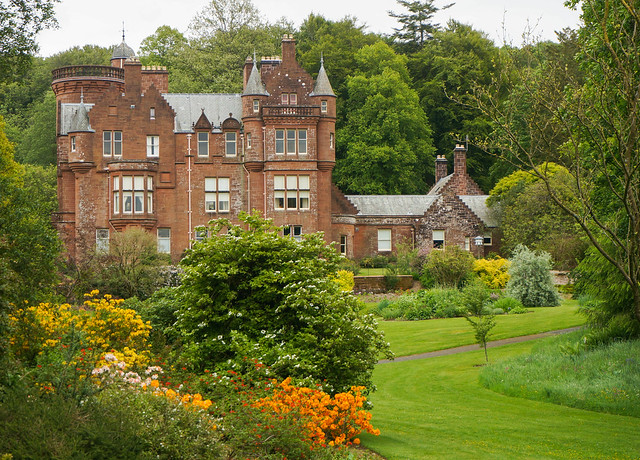
I could have stopped for tea at a cafe there, or even in Dumphries. Greg had researched a good candidate for me and it sounded perfectly fine. But I have this vision in my head of being finally, once and for all, on solid ground. My vision includes tea in the sun room at Three Glens.
I could not shake away my vision. I drive home with no more interruptions. To the village of Moniaive. To Neil and Mary's pastures of sheep. To Three Glens.
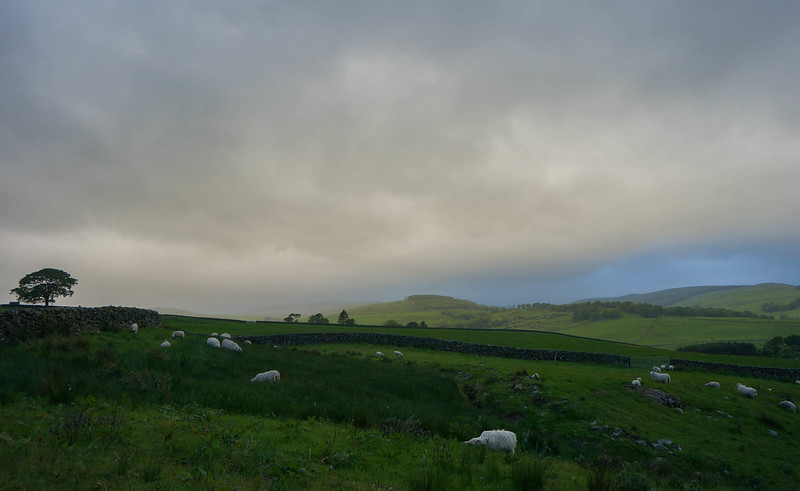
For dinner, Greg read my mind. You stay here long enough and he can do that, it seems! I had just been wondering if the salmon in these parts was fresh and good. What a surprise to find first a fantastic root veggie soup for starters...

...and a local salmon for a main course.
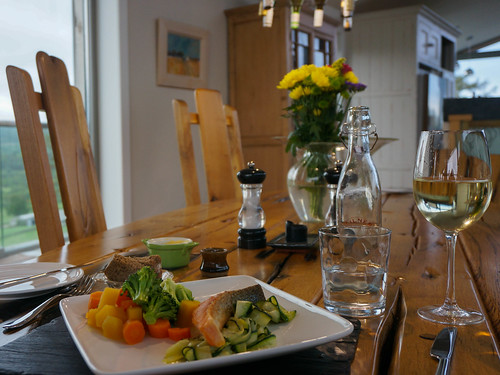
A beautiful ending to my days at Three Glens.
As I retire to my room, I hear the sound of a lamb. Well, that's not strange. Their voices make their way up the hill and I am enchanted by their gentle call every night. But this one seems close.
Ah -- he has jumped up to be where he should not be -- right by my patio door! You can mark the progression of time when a child or a lamb has climbed out of her youngest years and jumped into territory that is new and sometimes even frightening.
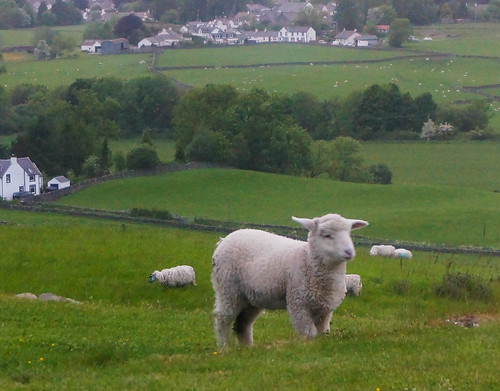
I get it, little one. The thing is, you're okay. You'll find your way.
And of course, she does. She takes a big leap and lands back on the same level with the rest of the flock. Which is not to say that tomorrow she wont be looking for new adventures. But for tonight, she's safe.

